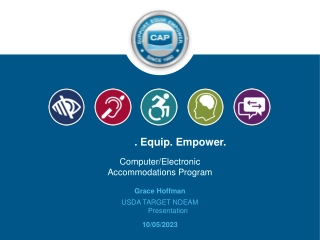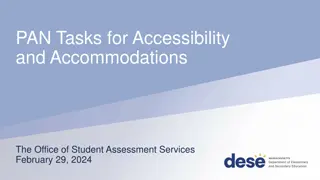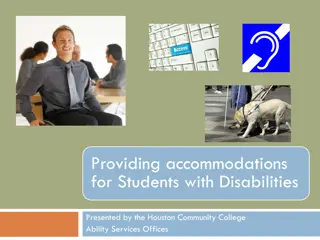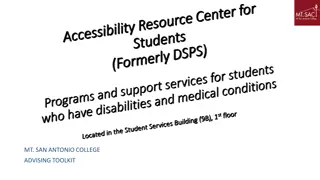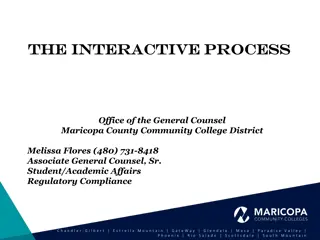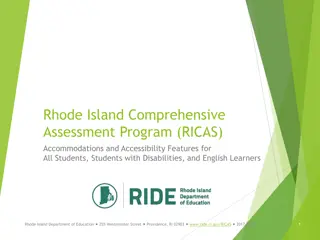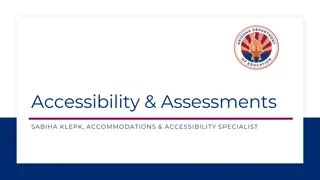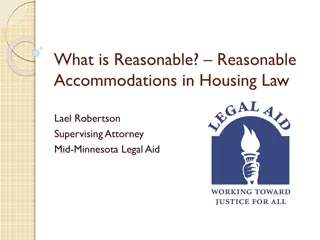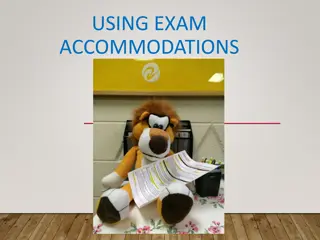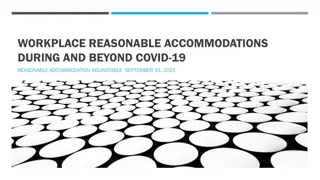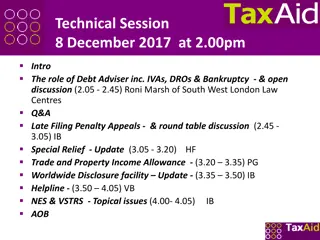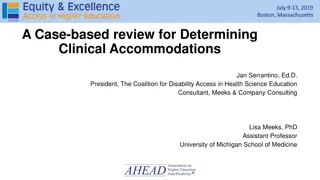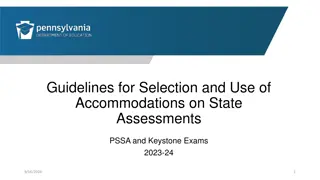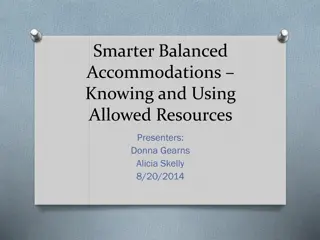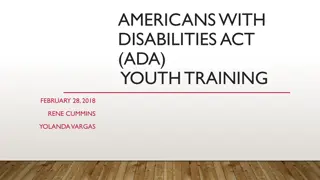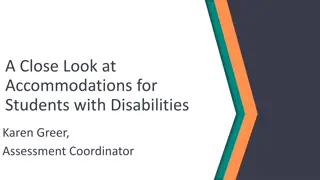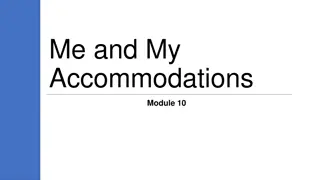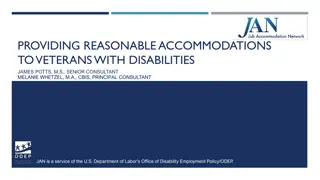Language Access & Reasonable Accommodations in Court
Explore the importance of language access and reasonable accommodations in court settings, detailing laws such as Judiciary Law 390 and Uniform Rules for NY State Trial Courts Part 217. Discover top non-English languages used in court, in-person translation services, and how to report interpretation problems. Learn about the Americans with Disabilities Act (ADA) and its protection against discrimination for individuals with disabilities.
Download Presentation

Please find below an Image/Link to download the presentation.
The content on the website is provided AS IS for your information and personal use only. It may not be sold, licensed, or shared on other websites without obtaining consent from the author.If you encounter any issues during the download, it is possible that the publisher has removed the file from their server.
You are allowed to download the files provided on this website for personal or commercial use, subject to the condition that they are used lawfully. All files are the property of their respective owners.
The content on the website is provided AS IS for your information and personal use only. It may not be sold, licensed, or shared on other websites without obtaining consent from the author.
E N D
Presentation Transcript
Language Access & Reasonable Accommodations in Court Justin R. La Mort Mobilization for Justice
Language Access
Uniform Rules for NY State Trial Courts Part 217 All Civil and Criminal cases Applies to parties and witnesses No charge for interpretation Person may waive with consent of the court 3
Judiciary Law 390 Whenever any deaf or hard of hearing person is a party to a legal proceeding of any nature, or a witness or juror or prospective juror therein, the court in all instances shall appoint a qualified interpreter. 4
Top 10 Non-English Languages Used in Court Albanian Arabic Bengali Cantonese French Haitian Creole Mandarin Polish Russian Spanish 6
In-Person Translation (Brooklyn) Spanish (M-F) Haitian Creole (M-F) Polish (M, T, W, F) Russian (M, T, R, F) Arabic & French (M & T) Cantonese (M & T) Mandarin (M-W) 7
Report Problems with Interpretation Tell the Judge UCS Office of Language Access at: - 646-386-5670 - interpretercomplaints@nycourts.gov 8
Reasonable Accommodation
ADA The Americans with Disabilities Act (ADA) is a federal law prohibiting discrimination against qualified individuals with disabilities. As defined by the statute, a person with a disability is one who has a physical or mental impairment that substantially limits a major life activity. 10
ADA A person with a physical or mental impairment might be someone who has an orthopedic, visual, speech, or hearing impairment, or be someone who has a disease or condition that is not immediately apparent, such as cancer, heart disease, diabetes, an emotional or mental illness, or an intellectual or learning disability. 11
ADA Many other kinds of physical or mental disorders or conditions may also qualify as a disability under the ADA if they substantially affect a major bodily function or an activity important to daily life, such as, for example breathing, walking, talking, seeing, hearing, or performing manual tasks. 12
ADA An accommodation is anything the court system can do or provide to make sure that a person with a disability has an equal opportunity to participate in a court proceeding or make use of the court s services, programs, and activities. 13
Providing Aids & Services Assistive listening devices, qualified American Sign Language or other types of interpreters, and Communication Access Realtime Translation transcription, for a person who is Deaf or hard of hearing. Copies of court documents in large print, Braille, screen readable, or audio formats for a person who is blind or has low vision. 14
Reasonable Modifications relocating a proceeding to an accessible courtroom filling out a court form for a person with an impaired ability to write permitting the use of a service animal by a person who is blind or otherwise relies on a dog trained to do work 15
Making an ADA Request Call (646) 386-5409 send an email to Chief Clerk Alia Razzaq at ADANYCCIV@nycourts.gov. Please put "ADA Accommodation Request in the subject line. https://portal.nycourts.gov/ada- wizard/ 16
Request Denied If the request was denied by a judge then the decision would need to be appealed in the same manner as appealing any other court order. 17
Request Denied If the request was denied by a clerk you can appeal by a form or letter. The form is at https://ww2.nycourts.gov/ada- accommodation-request-process- 32956#how2 18
Request Denied You must submit the reconsideration request no later than 10 days after the date of the written denial. 19
Request Denied Your name, address, and contact info. Name and location of the court or court facility where you wanted the accommodation. Explanation of why the decision was wrong and why it should be reconsidered. Describe the remedy requested. Copy of the denial. 20
Request Denied Letter by mail or e-mail, to: New York State Office of Court Administration Statewide ADA Coordinator 25 Beaver Street, 7th Floor New York, NY 10004 e-mail: ada@nycourts.gov 21
If you have any questions or concerns, please email ada@nycourts.gov or call the ADA Office at (212) 428-2760. 22



